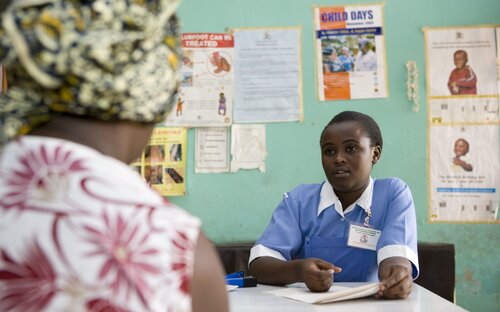UHC2030 is excited to welcome several new and distinguished...
13 July 2020
By Robinah Kaitiritimba, Executive Director of Uganda National Health Consumers’ Organisation (UNHCO) and member of the WHO Advisory Group on the Governance of the Private Sector for Universal Health Coverage.

The world’s scientific community and modelers of the pandemic’s progress across the globe are recalculating.
Why has Africa so far been spared the pandemic’s onslaught? Where is the COVID-19 wave, predicted to overwhelm African health systems? These questions do not imply that the wave will not come, rather, it has not come as initially predicted.
While theories abound and models are recalibrated, one piece of this puzzle lies with Africa’s experience of health; the continent is well versed in communicable disease and the unrelenting demands of epidemics.
Most recent of these was Ebola. Lessons emerging from this experience have highlighted the importance of engaging communities, the private sector and civil society in response measures. Some African countries were quick to adapt to include a broad spectrum of perspectives, resources, and structures. COVID-19 now challenges African nations to reflect on these experiences and build a strong and inclusive response.
Uganda is one country with extensive experience in effective responses to communicable diseases and epidemics. It was a pioneer in containing Ebola in the north of the country in 2000. Central to this success was multi-stakeholder engagement that included the private sector and civil society. This approach fostered solidarity and an effective community response to public health interventions. This is in line with the 6th Key Ask from the universal health coverage (UHC) movement - ‘Move Together’ - which requires establishing multi-stakeholder mechanisms for engaging the whole of society for a healthier world.
The importance of an inclusive, multi-stakeholder response remains critical in the context of COVID-19. The Ugandan government acted quickly by closing the country’s borders, imposing strict curfews and restrictions on movement. The government has however acted unilaterally, restricting consultation and contributions to decision-making. While the Ugandan government has reported few COVID-19 cases, this has come at the cost of multi-sectoral action. It has fueled growing demands from civil society and the private sector for greater accountability.
Stakeholders have different roles to play in the COVID-19 response:
- The government sets and oversees the direction, duration, and scope of the response
- The Ministry of Health is the steward of the public health response
- Civil society, communities, traditional leaders and citizens engage collectively in the response
- The private health sector contributes to the public health response and, as community members, in collective engagement.
Accountability levers should work together and reinforce each other as part of a multi-stakeholder response. Uganda is no exception. Accountability levers exist in the country but to date, have been more often focused on what is not working in the COVID-19 response. For example, civil society has been at the forefront to:
- Expose the preventable deaths and suffering of pregnant women brought about by the transport ban.
- Advocate with national leaders for maternal and other essential health services to function during COVID-19.
- Raise the plight of people living with HIV and the challenges they have faced in accessing treatment.
While these examples highlight the importance of corrective action by government, they are not the same as taking collective multi-stakeholder action in the COVID-19 response. Uganda should now be applying its learning from its own history of effective multi-stakeholder responses to other epidemics and crises. Indeed, as Dr. Tedros Adhanom, Director General of WHO said, “It’s the empowerment of communities and civil society that will help defeat COVID-19.”
To ensure a strong multi-stakeholder response, the Uganda National Health Consumers’ Organisation and its partners propose the following recommendations:
- Promote community trust and ownership for a more effective COVID-19 response
- Enlist the media as a tool for engagement and a means of amplifying voice and accountability
- Enlist the private sector in the COVID-19 response and the delivery of essential services
- Ensure government transparency in its use of COVID-19 resources, including personal protective equipment
- Provide real time data and enlist stakeholders – government, community, and private sector – to support an evidence-based COVID-19 response
As the lessons of responding to Ebola demonstrate, engaging communities, the private sector and civil society are crucial in our COVID-19 responses, and in progress towards UHC. We can Move Together, through the establishment of multi-stakeholder mechanisms that engage the whole of society for a healthier world, building a social contract between the government, public and private health sectors and citizens.
About the Author
Robinah Kaitiritimba is the Executive Director of Uganda National Health Consumers’ Organisation and a member of the Advisory Group on the Governance of the Private Sector for UHC.
The Advisory Group on the Governance of the Private Sector for UHC provides strategic guidance on the development of a roadmap on the private health sector and service delivery, which outlines governance behaviours to align private health sector service delivery with UHC goals. See other blogs relating to the private sector and UHC here.
This blog is a product of the World Health Organization’s Private Health Sector Engagement for COVID-19 Initiative (WHO-PCI).
Photo: WHO / Christopher Black
Category: Leave no one behind
